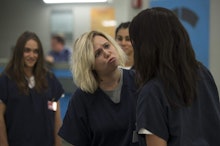The new season of ‘OITNB’ begs the question: Why is it so hard to do a good Boston accent?

The sixth season of Orange Is the New Black dropped Friday, and one of the new season’s big baddies is Madison “Badison” Murphy, a snarky Bostonian with a shamrock tattoo on her neck. Played by Amanda Fuller, Badison is one of the new inmates introduced in the latest season, which sees the familiar cast of characters separated in maximum security prison after season five’s riot.
Badison name-drops the Wahlbergs, talks about the “old neighborhood” and does everything short of pahking the cah on Hahvahd Yahd to let us know where she’s from. But although Fuller does an admirable job attempting her character’s Boston accent, it falls slightly flat. Which begs the question, why is it so hard for actors to pull off a Boston brogue?
To be fair to Fuller, this reporter may have a more sensitive ear for the Boston accent then most — I grew up in Massachusetts and my very own father, Chuck Swartz, a native of Revere, Massachusetts, took years to shed his own Boston accent. It makes him, understandably, very sensitive to the nuances of the dialect.
He was quick to offer a long list of actors who, in his opinion, have done terrible jobs of imitating Boston accents — Milo O’Shea in The Verdict, Vera Farmiga in The Departed, Melissa Leo in The Fighter and “the man in the rowboat in the pond in Jaws.” Other examples of gallant but failed attempts include Robin Williams in Good Will Hunting and George Clooney in The Perfect Storm.
“It is a difficult accent to nail,” Brooklyn-based dialect coach Eliza Simpson, who works with actors, said in a phone interview Tuesday. “There are, even within that one city, a lot of accents that are all native Boston accents. So there’s going to be a lot of variation.”
It’s the subtleties that make Boston accents so difficult to imitate, Simpson said. The most recognizable part of a Boston accent is what’s called the “non-rhotic” Rs — the dropping of the “R” sounds after vowels.
That said, Simpson said she thought Fuller did a decent job imitating the Boston accent. “Amanda Fuller does a pretty accurate Boston accent,” she said. “There are, again, some details, depending on where you’re from, that you might take issue with. But the main thing is that she’s being very consistent in her sounds.”
Fuller does what Simpson called “a lip-corner retraction,” almost a smile in the corner of the lips that serves to broaden certain vowel sounds, a key part of a Boston accent. Fuller’s attention to detail is certainly impressive, but whether it helps her pull off a Boston accent that would pass for native on the North Shore is another story altogether.
Beyond the lack of “R” sounds, the Boston accent has a lot of characteristics “you just don’t hear anywhere else in the country,” Simpson said. As my dad pointed out, “People in Boston not only drop Rs, they put them where they don’t belong. Pizzer and beeh.”
Simpson shared some tips for anyone who wants to pick up a Boston accent. First, choose a native speaker as a model and let them inform your accent. Second, let go of what you think you know about Boston accents and approach things with “no assumptions.” And third, know it will take lots of time to perfect your Boston twang — Simpson said it can take months to really “inhabit” an accent successfully.
It’s not out of reach, though — Simpson was quick to say “any accent is possible.” And the harshest of Boston-accent critics, my own father, conceded that some actors have pulled it off. Most notably, he said, were Robert Mitchum in The Friends of Eddie Coyle and “maybe” John Ratzenberger as Cliff on Cheers. Maybe.